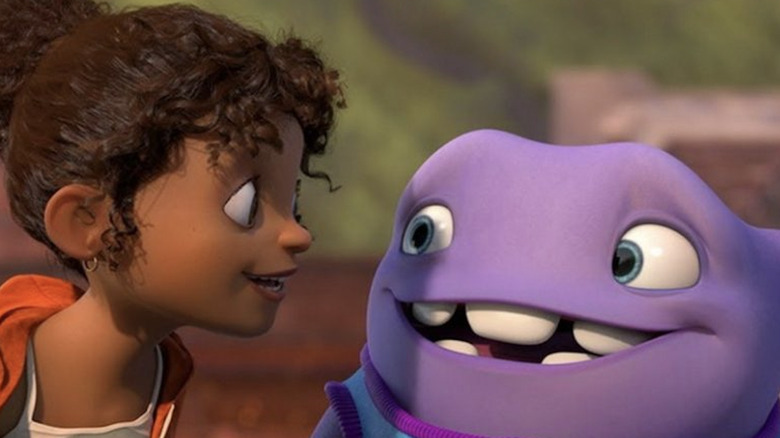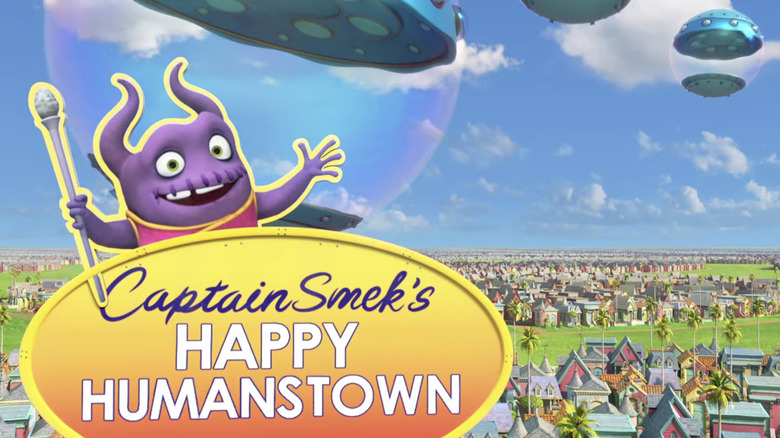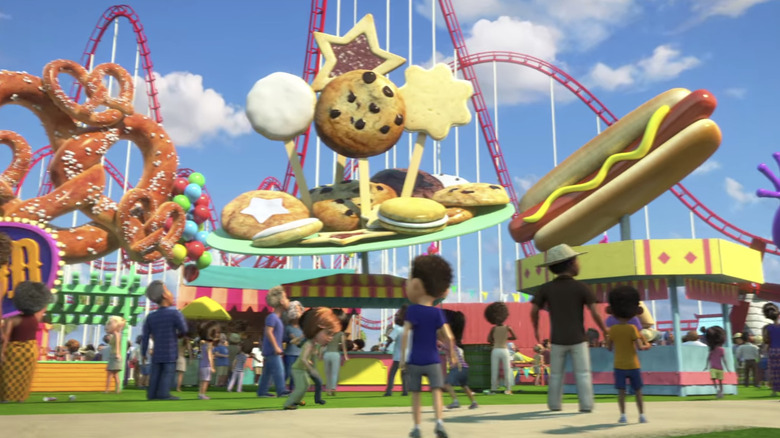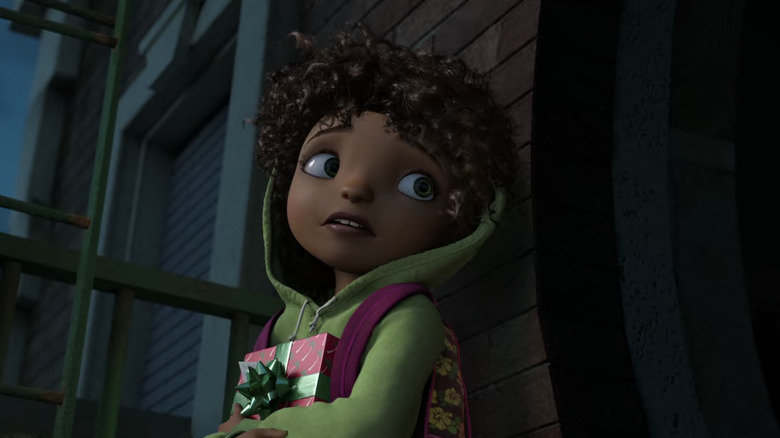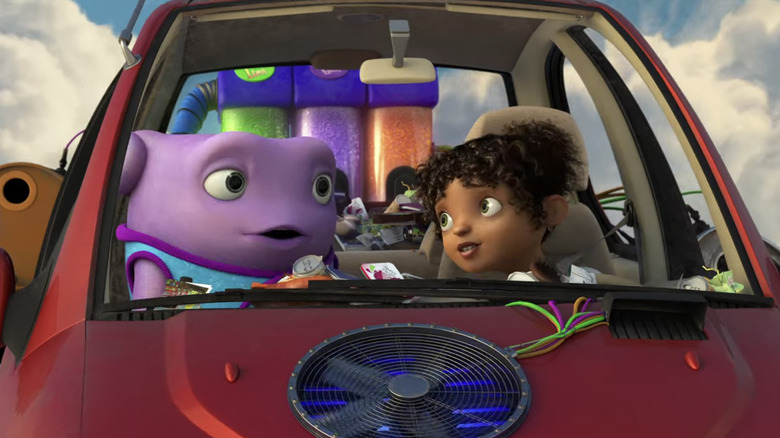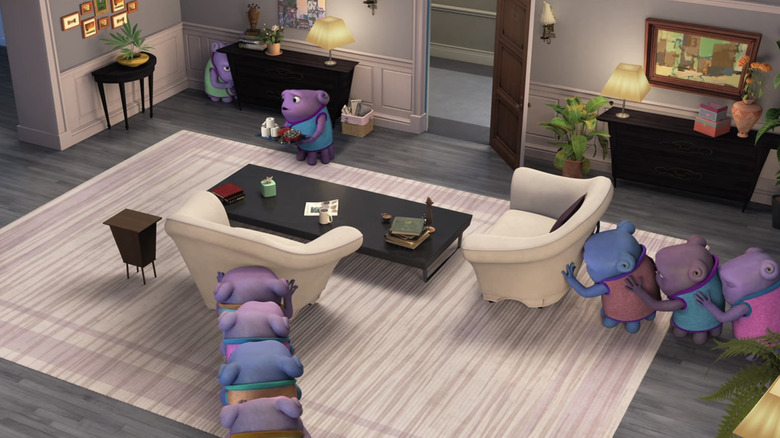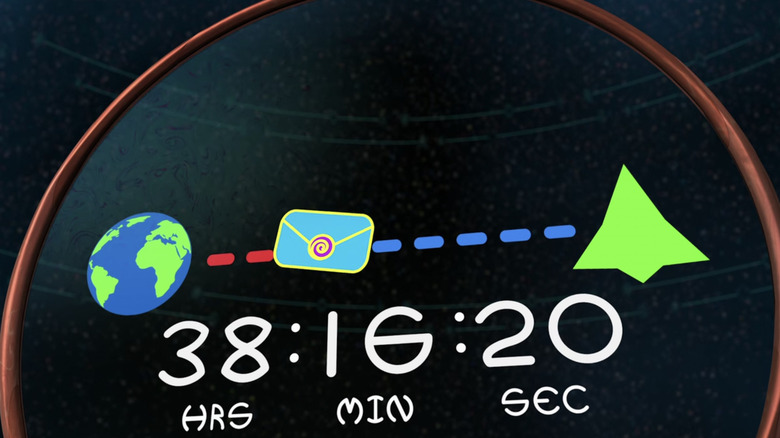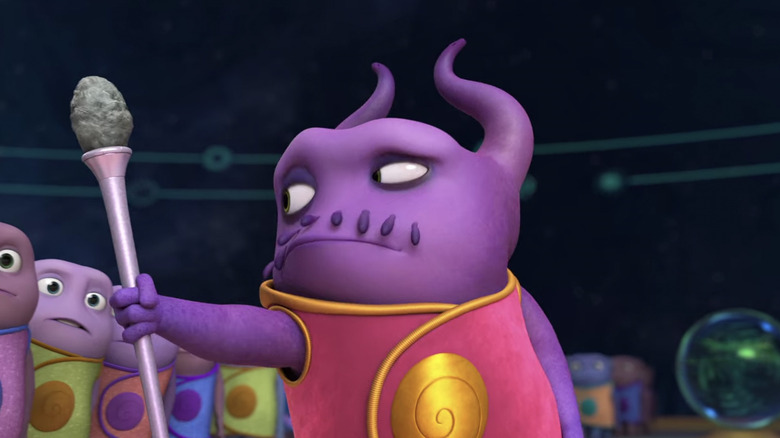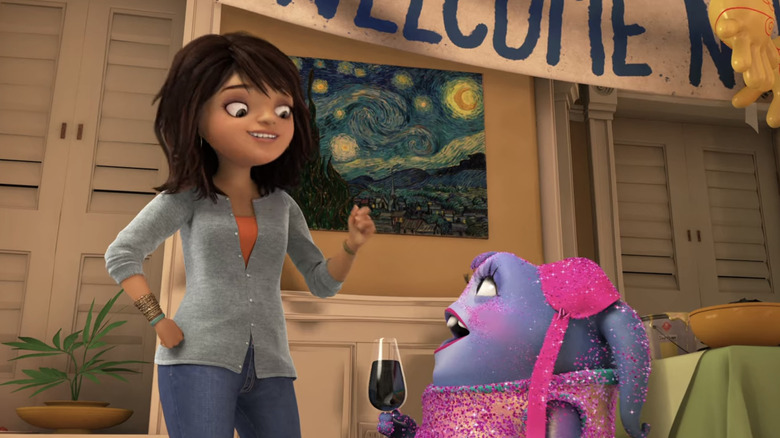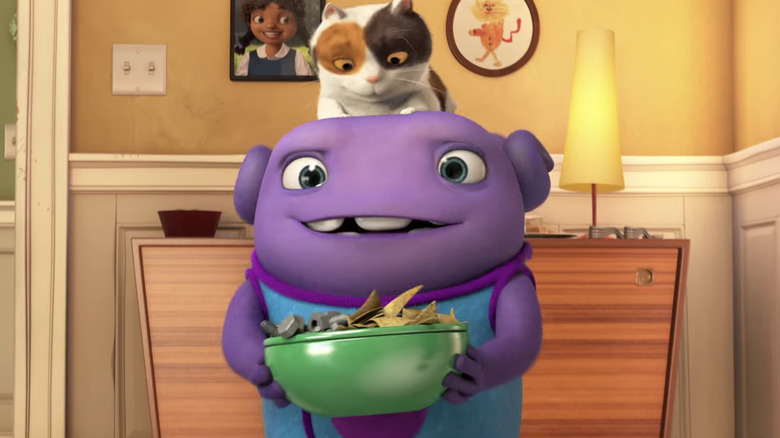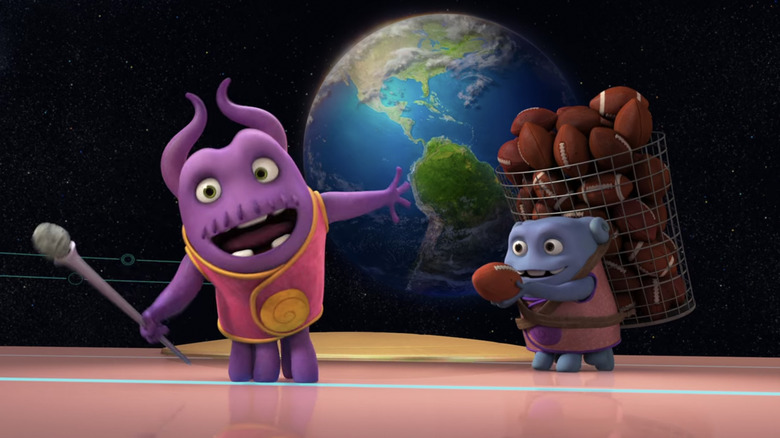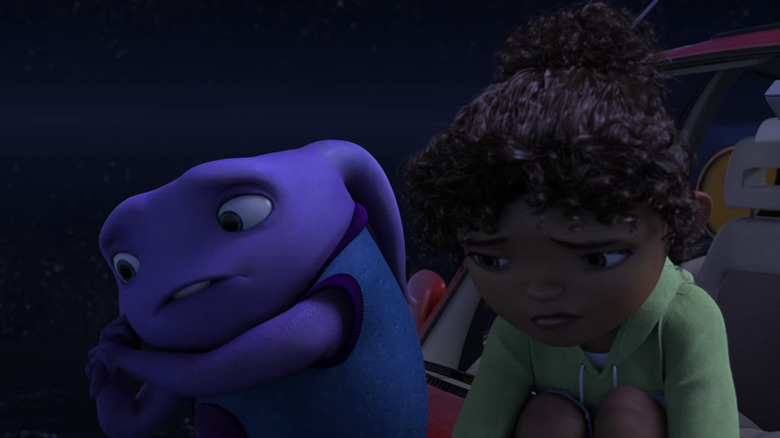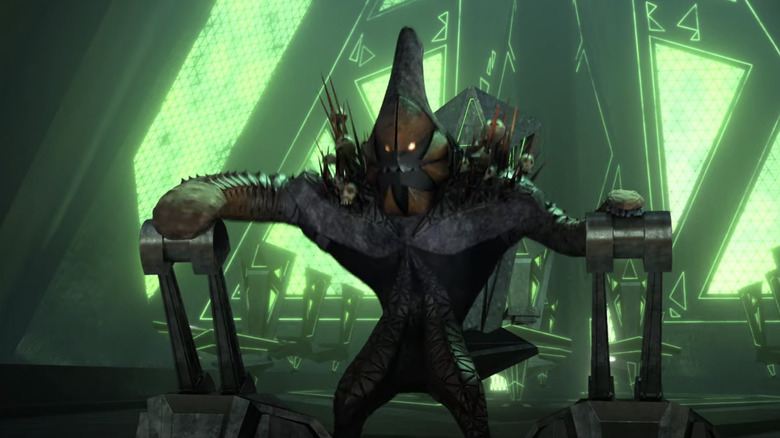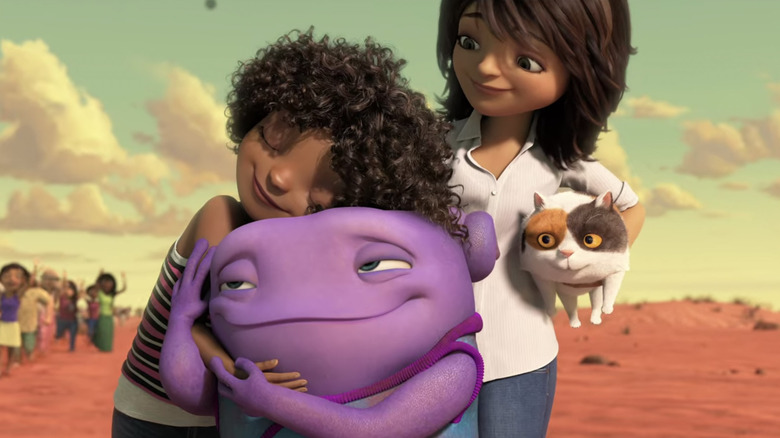Things Only Adults Notice In Home
There are a growing number of animated family movies that make real-world statements through the characters. The 2015 animated science-fiction comedy film "Home" is one such movie. But given its PG rating, these real-world events might be tougher for younger audience members to notice.
The film features a skittish alien race known as the Boov. When they invade Earth and relocate the humans to a small chunk of land, a Boov named Oh (Jim Parsons) meets a human — Gratuity "Tip" Tucci (voiced by Rihanna) — who has escaped the invasion and is in hiding. Oh tries to flee his fellow species because he accidentally sent an email containing the aliens' whereabouts to the rest of the universe, including the Gorg, an alien species the Boov are on the run from. Meanwhile, Tip is trying to reunite with her mother. Tip and Oh team up, and eventually help each other solve their problems, inadvertently saving the world in the process.
Though "Home" is a lighthearted frolic for all ages, there are plenty of elements in the film that tend to go unnoticed by younger viewers. Let's take a closer look at the themes, events and in-jokes only adults are likely to catch in this heartwarming tale of alien invitations, the importance of family, and not backing down from your fears.
Humanity's relocation would be catastrophic
The Boov appear to be peacefully relocating the humans, but by putting all of them in one location, they're actually creating a catastrophe waiting to happen. Sticking humanity together would likely lead to heated disagreements, differing viewpoints, infighting and ultimately war. Unfortunately, not all nations get along, and while world peace is what we aim for, the real world is disturbingly far away from that goal. But in "Home," the aliens stick all the humans together so they can selfishly enjoy the rest of the planet.
It's hard for an adult to not call out the fallacy behind this arrangement, noticing that it wouldn't end well — it's basic human nature, yet never addressed in the movie. It's not like the humans are happy that they've been uprooted from their lives, their world forever changed — but putting everyone in the same location would have more drastic outcomes than what's displayed on the screen.
How are there enough resources for humans after they're relocated?
There are so many questions about human relocation because, simply put, there are so few answers. As a more seasoned audience member, it's hard not to ask certain questions, such as: How are there enough resources for humans when they're relocated? Although things go back to normal for the humans by the movie's end, in the meantime, they're stuck in a foreign land and are expected to fend for themselves — although it appears some of the Boov stick around to assist them.
How do the Boov even know what the humans eat, let alone what they need for proper nutrition on a daily basis? Not all people, after all, eat the same food and many people have dietary restrictions that could mean the difference between life and death. Although it's presented for comedic purposes, the aliens believe humans can subsist on ice cream, hot dogs, and other carnival-esque food. Plus, these aliens don't eat "normal" human food. That is to say, they have a different concept of food and efficiency. They don't even know what food looks like, as they eat virtually anything that's not human food.
Keep in mind, food is only one resource essential to human survival. Imagine if the movie took the time to explain the logistics behind the aliens distributing water, medication, assistance for the elderly and infirmed, and so on.
How did one human child and a cat escape the invasion?
Okay, a human had to escape so she could team up with an alien — or else there wouldn't be a movie. The audience gets that. But as an adult, it's hard not to see the inconsistencies as one human child and a cat escape a Boov invasion easily, one powered by otherworldly technology that seems to have no issues capturing all the world's elite military members, highly-trained martial artists and presumably, even Chuck Norris.
These aliens are advanced beyond human comprehension — yet Tip, who's a child, and her cat, who's ... well, a cat, elude the invasion. The child apparently escapes because her cat was on her head when the aliens were detecting what was and wasn't human. So the aliens detected the cat as not human, yet didn't detect the child. They released the cat and Tip.
This is pretty absurd, considering the aliens can get rid of gravity with the push of a button, but they make this simple mistake. It seems crazy that every other person on the planet couldn't evade the alien invasion, but these folks could — then again, the same was true of The Mitchells vs. The Machines.
An all-star cast worth singing about
Whether you're an adult or a child, it's not always easy to decipher the voices of animated characters. You can't, after all, see the actors. Even still, it's sometimes easier for an adult to recognize the voices, especially in a film like "Home," as adult actors portray the animated characters.
On that note, singer Rihanna voices Tip, comedian Steve Martin voices Captain Smek, actor Jim Parsons voices Oh, and Jennifer Lopez voices Tip's mother, Lucy Tucci. Rihanna, of course, doesn't always have the most child-appropriate lyrics, Martin broke out as a comedian and actor well before the '90s, Parsons is an adult actor famous for his work on "The Big Bang Theory," and Lopez broke onto the movie and music scene in the '90s.
Although these actors are still thriving, most of them began their careers well before many younger viewers were even born. So, while hearing Steve Martin's voice might not bring much beyond surface-level-pleasure to your kid, consider how much accumulated-goodwill he has in the mind of adults (remember all those "SNL" appearances? Wild and crazy guy? "Dirty Rotten Scoundrels"? "Cheaper by the Dozen?") who can't help but feel the warmth of sweet nostalgia as soon as he speaks. It's interesting to consider how, as adults, such factors can have a very different impact on how we enjoy a film like this, versus our children.
Oh shows symptoms of being on the spectrum
Although Oh is an alien, it's hard for an adult not to notice that the little guy displays symptoms of autism.
Oh appears to be the nicest alien in existence, yet the other aliens avoid him because Oh gets on their nerves — and he doesn't comprehend this. Most noticeably, Oh takes what people say literally and he also doesn't understand certain social situations. For example, Oh doesn't understand what the expression "put yourself in my shoes" means. He wonders how he can put himself in Tip's shoes because his "feet" wouldn't fit. He also doesn't understand the phrase "you took forever" because he takes that time frame literally. In his mind, "forever" means forever — he can't comprehend figurative language.
Ultimately, of course, all ends as it should: Oh helps save the day and turns his enemy into an ally. Oh, like the movie as a whole, can be appreciated with the keen mind of an adult or with a kid's eternal joy.
Oh having contact with the galaxy is a disaster waiting to happen
Instead of inviting fellow Booves to his party — most notably, Kyle (Matt L. Jones), a Boov police officer — Oh invites the entire galaxy, which includes planet-destroying Gorg. That's all well and good, but it's hard for a seasoned viewer not to question this event. If the rest of the Boov don't fancy Oh, then why in the world — nay, galaxy — would they allow him to even have access to interstellar email? Isn't that just an accident waiting to happen?
Of course, Oh hits "send all" on his email, because it would be like trusting a 5-year-old to send emails to your co-workers and hoping he doesn't "reply all" the entire company. Simply put, the Booves get what they deserve for allowing Oh to be able to send an email to other alien species in the galaxy — especially, potentially, the enemy the Booves are on the run from.
But, of course, Oh is given this capability. It all works out for the Boov in the end, but maybe they should still take away this privilege as Oh is prone to making simple mistakes. But seriously, why does Oh even have the Gorg's contact information in the first place?
Captain Smek is incompetent
Captain Smek is somehow the leader of the Boov. He mostly uses his power to devise awful plans (such as running from the enemy) and brag about his position. Yet he blames his mistakes on everyone else. Which most adults will notice isn't too far off from certain leaders in real life. People let power get to their heads, and it controls them until it inevitably takes them down or makes them more evil.
In Captain Smek's case, he's totally incompetent and isn't capable of leading his people, despite having world-defining technology at his disposal. To younger audience members, his incompetence can be viewed as a joke, but it's not hard for a more seasoned viewer to notice that he's not adequate at his job and his ineptitude could lead to drastic outcomes. Or, you know, Captain Smek blaming his mistakes on other Boov and continuing to rise in the ranks — until, at long last, his lack of qualifications and poor execution are finally discovered.
Vincent van Gogh's The Starry Night is prominent in the film
You don't have to be an art aficionado to recognize Vincent van Gogh's "The Starry Night" painting. It is one of the most popular paintings of all time, and the masterpiece just so happens to be prominent in "Home."
From one of the Boov almost eating the painting, to it being placed in the backseat of Tip's car, to it appearing once more at Tip's apartment, the painting acts as an inanimate character in this animated film. You don't have to be an adult to recognize and appreciate art, yet more time on this planet gifts adults with more opportunities to see "The Starry Night" painting, whether it shows up online, at a gallery, or in a movie such as "Home."
That painting, of course, is practically priceless. Tip was lucky enough to come into contact with it, and now it lives on a living room wall.
The Boov have a unique appetite
The Boov will seemingly eat anything ... except for human food, which very well could be a comment on the food humans eat, or perhaps the Boov just have terrible taste. As an example, the Boov eat nuts — but not peanuts, they eat metal nuts. Yet, this alien species makes fun of humans for eating ice cream? Seriously, is there anything more *chef's kiss* delicious than ice cream?
Now, the Boov almost definitely have a different digestive system than humans, and who really knows if things such as calories, carbs, protein, and fat carry over to their genetic makeup. Nevertheless, it's hard not to question their appetites. Does metal really give them the necessary nutrition they need to survive? Have they ever heard of a vegetable? Could someone please introduce the Boov to a sit-down restaurant?
Colonialism is a dark theme for a kid's movie
It's nearly impossible for a seasoned viewer to shrug off the fact that the aliens invaded earth and displaced the humans from their homes. Let's recap that one more time: The Boov invade a planet and displace the natives, all while claiming they're helping them. That's colonialism 101, and it's a really dark message for a PG-rated movie.
The Boov are led by Captain Smirk, a leader who only cares about his own livelihood and well-being. Oh doesn't even realize what the aliens did until Tip breaks it down for him. Oh empathizes with Tip and inevitably helps the humans get their land back. Yet the Boov weren't doing humanity a favor. They forced humans to live in a foreign place, uprooted everything they knew about life, and they patronizingly told them what's best for them.
Tip struggles to fit in with American culture
Although it's glazed over and isn't necessarily the most direct theme of "Home," it's revealed that Tip, who's from Barbados (like the actor voicing her, Rihanna), struggles to fit in with American culture. She's even bullied by her peers. This is the one thing that Oh and her bond over, as Oh is also viewed as an outsider by his own species and he can't seem to fit in.
Though the creators don't make it the focal point, Tip has an accent and brown skin, and she doesn't fit in with kids at her school because of her differences. For what it's worth, Tip's appearance is different from the hero of most animated kids' films, who are usually white, yet this is subtle and harder for a younger audience member to pick up. Luckily, Tip and Oh find each other. Despite their differences, they help save the world and find solace in one another. Friendships, for better or worse, sometimes spawn from odd circumstances or shared trauma.
Desperation brings on destructive behavior
Though "Home" isn't the most violent animated movie of all time, the characters prove that desperation brings on destructive behavior. Tip physically harms Oh on a number of occasions, yet Oh is never hurt thanks to some movie magic sprinkled on these events. The Gorg destroy planets when they're desperate. It's not hard for an adult to realize that this film portrays beings being destructive when someone's back is up against a wall. Yet, all characters are the heroes of their own story, so they rationalize their bad behavior.
Humans aren't perfect, yet it's very human for people to think they are, above all else, justified in their actions. Oh and Tip both realize they're wrong in certain situations, allowing them to grow and mature. When they work as a team and inadvertently agree on a universal goal, they become better people and actually do good for everyone involved. The lesson? Violence isn't a great solution.
The overall messages are magical
Despite all these realizations, the overall messages of "Home" are universally beautiful: family is essential, and people should face their problems and fears instead of running from them.
Though Tip didn't take all the right steps, her motive was to reunite with her mother. The Boov learned an invaluable lesson — and gifted this same knowledge to audience members — that running from your problems doesn't actually solve your problems. By the movie's end, Tip proves how important family is and, in a way, that "family" is the real meaning of home — and Oh runs toward his fears, instead of away from them.
Ultimately, "Home" ends on a pleasant note for everyone, even the Gorg — which ends up being a starfish-like creature in search of its family. This being was the last of its kind, and the Gorg was merely trying to retrieve the rock that Smek stole because it's actually an egg consisting of millions of developing Gorg larvae, the next generation of the species. The film's messages might land differently for kids and adults, but all viewers are united in appreciating a tale about the true message of home.
